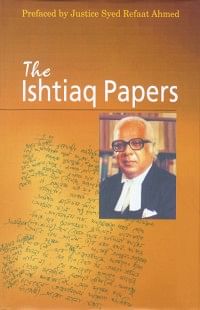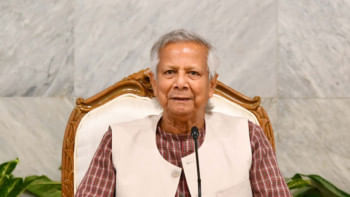A great lawyer

Syed Ishtiaq Ahmed (1932-2003) is best remembered by his admirers and jurists in Bangladesh and the rest of South Asia not only as a specialist in constitutional law but also as an eminent non-political activist who took special interest in trying to find a pragmatic solution to the existing problem of dysfunctional politics within our country. Concerned about the prevailing "closed shop trade union" syndrome that afflicts most political parties in Bangladesh, Syed Ishtiaq Ahmed (a former attorney-general of Bangladesh and an adviser to two successive caretaker governments) and a few others had the courage to try and find an effective method out of the madness.
It would be fair to agree that this informative posthumous publication, which has coincided with the commemoration of the 76th birth anniversary of the author, carries with it the "intrinsic worth" of being a serious documentation and record of the development of events associated in the nation's quest for institutionalising a democratic order.
Interested since the early eighties in organising the "anti-autocracy movement" (also known as the "movement for the restoration of democracy") along with other eminent lawyers of the Supreme Court Bar Association, Ishtiaq Ahmed gradually emerged in the following years as a committed champion of democracy and the Rule of Law.
His pro-active and conscientious role in trying to find a practical solution to the political imbroglio in the beginning of the nineties firmly established him as one who was able to discern and identify least common denominators within "competing and discordant notions of neutrality as propounded by the key political parties" in Bangladesh.
This book will be of great interest to discerning readers and political commentators, particularly in the context of the frustrating nature of the current political process as it obtains here. This aspect assumes importance, given the efforts undertaken by Syed Ishtiaq and his four other concerned friends, which eventually led to the emergence of the caretaker concept and the 13th Amendment to the Constitution.
The subjects and issues covered in the publication are complex and legal in their nature. The author has, however, made them both readable and easy to comprehend through a style, both in English and Bangla, that flows freely and generates interest. He has, for this purpose, chosen a simple approach. In this context, the best example is the very first chapter, and the manner (laced by a tinge of humour) in which the genesis of the political problem of boycott is traced within our parliament.
It is interesting to be reminded that what started with the issue of Palestinians being gunned down by Jewish extremists on February 25, 1994 in Hebron has now unfortunately become part of the parliamentary democratic culture in our Jatiyo Sangshad.
The author, in his notes, has not only carefully followed the evolution of the controversial political problems in 1994 and 1995 but has also enriched the narration and analysis with references to various cases, judicial decisions, and details of views expressed by the chief protagonists involved with the political dynamics.
His commentary in this regard will reveal to the reader the steps and measures that eventually led to the well-known "Ishtiaq formula." The re-prints of newspaper reports of that period will also be of immense benefit for researchers and political scientists.
The reader will realise through the second section of the book, entitled "The 1996 Caretaker Government at Work," that the demand for free, fair and credible elections is something that has persisted within our body-politick for nearly two decades. He will also find it most useful to be informed about the manner in which the intricate political crisis was managed and resolved by the caretaker administration in 1996.
In a matter-of-fact manner, the author outlines how the interim government, during its short tenure, dealt with emerging challenges, discharged both routine and policy functions, and ensured the holding of general elections for the Members of Parliament peacefully, fairly and impartially. I feel that the present Election Commission and the current caretaker government would do well to read this section of the book in particular. It might help them in the successful performance of their expected tasks.
This publication assumes special significance not only for the wealth of historical details but also for the practical advice with regard to the approaching of constitutional complexities.
The preface acknowledges that this publication has been a collective effort. Those associated in this enterprise deserve thanks for having presented to a wider audience the background of a successful tale that harnessed necessary political will and foresight to overcome political intransigence.
"The Ishtiaq Papers" edited and prefaced by Justice Syed Refaat Ahmed, published by The University Press Limited, 152 pages, Taka 350/-

 For all latest news, follow The Daily Star's Google News channel.
For all latest news, follow The Daily Star's Google News channel. 



Comments